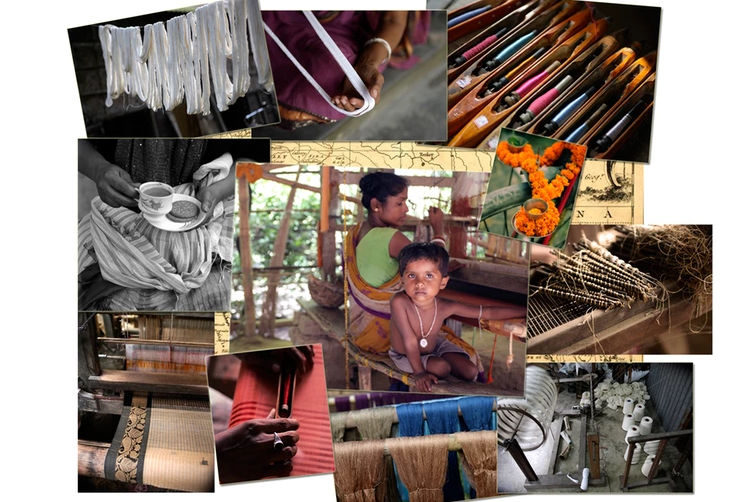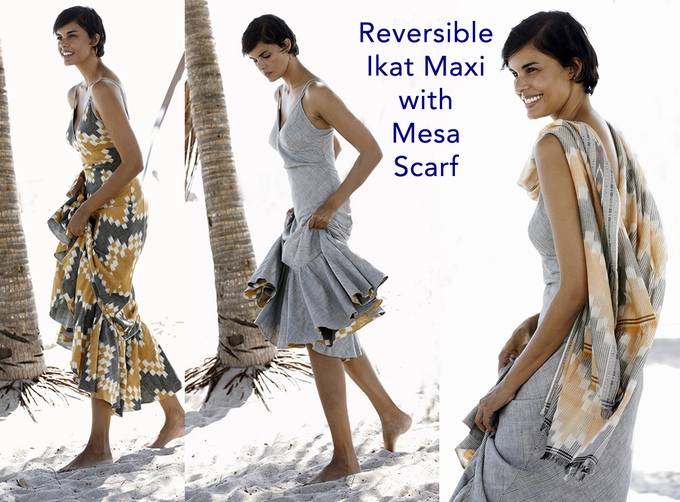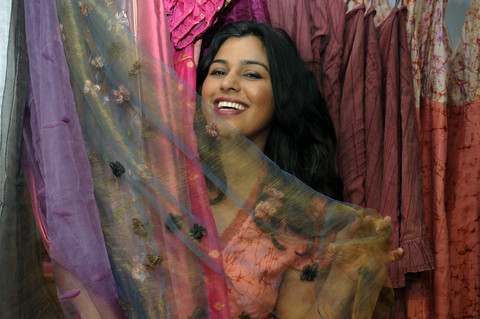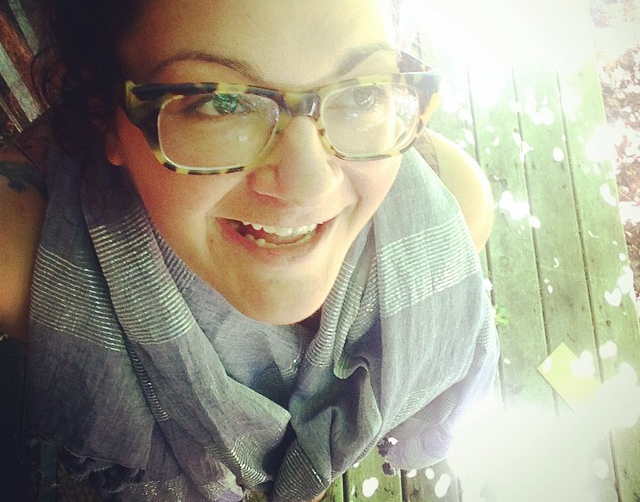
Indigo Handloom: Human-Powered, Artful Textiles Are Carbon Neutral

Indigo Handloom‘s project is one of the most impressive Kickstarter campaigns I’ve seen in some time. In short, the company, who has already worked with ethical fashion industry leaders like Eileen Fisher, is making carbon-neutral fabric that’s beautiful, wearable, and directly (and fairly) supports those people who create it.
They call themselves the World’s Greenest Clothing and they might be right about that. Not only is no energy used to create the cloth but it is chemical-free, meaning its safe for workers (and for you and your skin).
In the making of an average button-down shirt today, the weaving of the fabric alone consumes 30% of the total energy used to make that shirt.
Each year, the world uses 132 million metric tons of coal, or 1,074 billion kWh of electricity, just to fuel the weaving of cloth.
Our cloth doesn’t consume even one piece of coal. Each handloom-woven garment saves approximately 1kWh of electricity, which is enough energy to power a laptop for 8 hours.
(You can see how much I loved this fabric in the video below!)
It’s not just energy that the company is saving by creating a market for their beautiful Khadi cloth:
Indigo Handloom preserves the ancient skills and jobs of artisan weavers in India, home to some of the greatest textile artisans in the world.
When we started Indigo Handloom textile wholesale in 2003, there were 12 million handloom weavers in the world. Now, there are only about 3 million left. We are losing the battle to preserve an ancient art form and all of it’s beauty.
Once upon a time, beautiful, woven textiles were considered more valuable than gold. Fabric was buried in the tombs of nobles around the world.
We have lost sight of our connection to these intimate materials – the materials that are physically closest to our skin.
I was impressed and fascinated by the story behind this label, and Smita Paul, the company’s designer and CEO was kind enough to answer my questions:
I have heard that Khadi cloth has a history in India, what is it?
Khadi is basically what sparked the entire non-violent movement that forced the British to leave India after 200 years. Khadi – which means hand-woven cloth made with hand-twist year was the cornerstone of Gandhi’s movement. His philosophy was that Indian’s – and specifically Indians in rural areas – could be self-reliant if they just focused on wearing khadi. The British were actually taking raw cotton from India, producing cloth in the mills of England and selling it back to Indians – often for hefty profits. Gandhi understood that cloth could still be made by hand – no need for machines – and started promoting it as a symbol of India’s overall self-sufficiency.
Today – khadi is still the cornerstone of village life in some areas. With enough orders, thousands of women can be employed to make the yarn for this super soft fabric. It’s the ultimate ‘eco-friendly’ fabric – because from raw fiber to finished cloth – there is no need for any fossil-fueled electricity.
About how many people do you employ and how many do you hope to once you are launched?
We employ around 500-600 weavers depending on the orders of our customers. Honestly it’s a drop in the bucket of what I’d like to achieve and what is available. Every week, I get an email from someone from different parts of India asking me to please work with them. The need for more employment is so great and I’m constantly thinking of new ways to use handloom – because I would love to create more work.
How did you decide on your designs for the line?
I’m very inspired from my move to California from the east coast. I never thought I would change my personal style – I was a dresses-and-heels kind of girl. But now that I’m in Oakland, I’m more interested in a more casual lifestyle. I love using these fabrics for tunics and easy dresses…very different from my line I had before when I had a store in Brooklyn. I also want to reduce the amount of zippers, buttons, etc in our work and create more easy pieces.

That reversible dress is genius—is there a story associated with that item?
I love any article of clothing that can pull double duty. I’m always on the look out for that – since I travel so often – I tend to pick clothes that can be worn for several occasions. I also love mixing patterns and different fabrics and putting them together – in a trim or a pocket or other detail. I was looking through some storage boxes and found one of dresses I made during my first job. It was all orange and pink silk in blocked color – so I guess I’ve been mixing fabrics for a long time! I also did a reversible wrap dress as one of my very first attempts with designing clothing with handloom – and it was our best seller. We had to line the fabric any way to give it body and make it less transparent – why not make the other side just as fun?
Can you tell me a bit about what your collab with Eileen Fisher is?
Eileen Fisher is a fantastic company and I feel very honored to have a relationship with them. They are really on the forefront of sustainable and responsible fashion. As a company, they have a real commitment to social consciousness and it shows in how they have approached the social project “The Handloom Project.” This project is a 6-year commitment to improve the lives of the weavers who work with Indigo Handloom.
This includes micro-financing, training and some medical help. This is really the first time a fashion company has attempted this hybrid model of a for-profit company/for-profit/non-profit working together to improve the life of workers. It’s been an interesting experiment – and I’m hoping at the end we will have an area in India where handloom is thriving and alive. When they approached to collaborate on this project – we had been supplying them scarves for several years – so we already had a relationship. They are a great company to work with – with an awesome sense of color. I’ve learned so much from them.
If there is one quote that sums up what drives us it is:
“There is no beauty in the finest cloth if it makes hunger and unhappiness”
– Mahatma Gandhi






